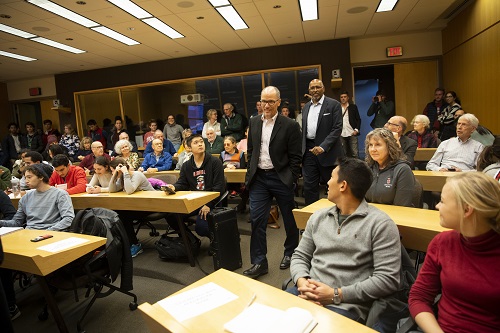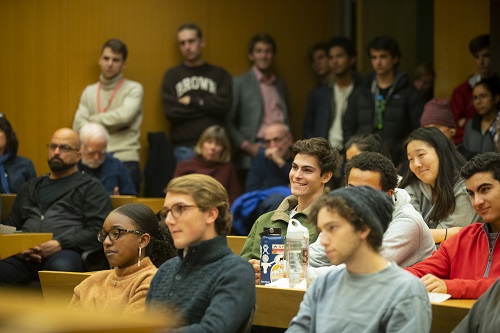PROVIDENCE, R.I. [Brown University] —In a forum titled “Across the Aisle: Before the Midterms” at Brown University on Thursday, Oct. 25, Democratic National Committee (DNC) chair Tom Perez and former Republican National Committee (RNC) chair Michael Steele led a lively discussion on the midterm elections, the polarization of politics and the importance of voting.
Watson Institute for International and Public Affairs director Edward Steinfeld moderated the event, the first in a two-part Watson series that will include a post-election discussion on Nov. 19.
“This is not about political theater or mud-wrestling,” Steinfeld said, “but an opportunity for real discourse about ideas.”
Perez, a 1983 Brown graduate, and Steele, who led the RNC from 2009 to 2011, are faculty fellows at the Watson Institute. While they agreed on points like the critical importance of voting and diverged sharply on others — whether the recent battle over Brett Kavanaugh’s nomination to the Supreme Court was due in part to Democrats’ opposition to the confirmation of Neil Gorsuch — they modeled during the panel how to “disagree without being disagreeable,” as Perez described it.

Steinfeld opened the discussion by asking whether a recent characterization of the major parties by New York Times columnist David Brooks as being “Trumpified” and committed to ethnic nationalism on the Republican side and focused on material commitments, like health care, on the Democratic side were fair. Brooks’ implication was that both parties had abandoned universal ideas and American values.
“Certainly on the Republican side, what we’re going through now is the culmination and ultimate manifestation of a long-going Shakespearean drama that started literally the day Ronald Reagan got on Air Force One and headed into the sunset,” Steele said.
Since Reagan, Steele said, there has been a constant struggle to define conservatism and Republicanism in terms of social, economic and political matters.
“What Trump did,” Steele said, “was come in and go, ‘None of that matters. The only thing that matters is me. The second thing that matters is I’m going to give you the space to articulate what you always thought and felt.’ And he gave voice to the anti-establishment idea that really sort of germinated inside the party.”
Steele said he thought that with this election cycle, the Republican party would continue to move in an anti-establishment direction and focus even more deeply on Trump, while Perez said that the war for the soul of the Republican party was over.
“The party of Lincoln is dead,” Perez said. “It’s been replaced by the party of Trump.”
Perez identified two competing narratives — of hope and fear — that are playing out globally, as nativism takes hold in nations all over the world.
“The reason I’m proud to be doing what I’m doing,” Perez said, “is that we are the party of hope.”
Perez said that the Democrats’ emphasis on health care and education, criticized by Brooks, is part of an effort to ensure that the opportunity to achieve the American dream exists for all Americans.
“We lost a lot of elections because we stopped organizing,” Perez said, including many state legislative seats as well as the 2016 presidential election. “We weren’t a 50-state party and our message got muddled. We paid a heavy price… The reason why I feel bullish about 12 days from now is that we’ve gotten back to our roots.”
Steele said that one of the interesting aspects of the current era is that it is not about policies, but about emotions, years of broken promises and President Donald Trump himself. Regarding the state and national races lost by the Democrats in the years leading up to and including 2016, Steele had a different outlook than Perez.
“The fact of the matter is, those races were lost for some very fundamental reasons,” Steele said. “There was a part of the country that the Democratic party stopped talking to and stopped listening to. Recovering that is not as easy as it sounds. That is not necessarily the test of this election. The test of what you’re saying will come when there is no Donald Trump on the scene. Because the emotions that Donald Trump evokes from individuals cloud all other judgments, all other perceptions. Please do not fool yourselves to think otherwise.”
Steele also predicted that if Trump were on the ballot in 12 days or in 2020, he would win, because no one else has made the case to the American people that there is something better.

Perez disagreed while acknowledging that politics has become intensely personal and emotional, facts are now considered optional and science could be disregarded. He emphasized that policy issues like health care, reproductive rights and the right to form a union are on the ballot, and that those and other issues amounted to an essential referendum on rights.
“Our democracy as we know it is on the ballot,” Perez said.
Steele said that in these circumstances, he was looking at every young person in the standing room only crowd to step up as citizens.
“You have no excuse not to engage in your civic responsibility to vote,” Steele said. “Just cut the crap. If you sit back on Nov. 7 without having exercised the franchise, you have forfeited your right to say anything politically about anything political until 2020. This is your moment.”